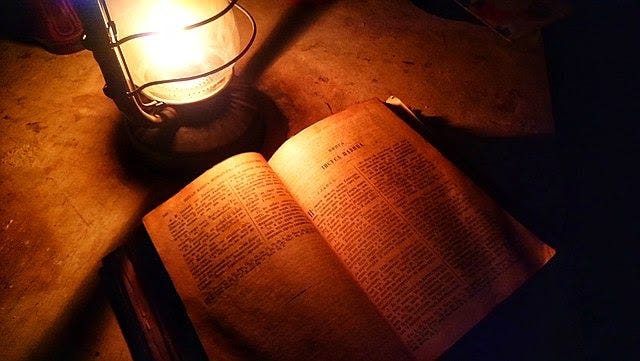Welcome to the Daily Bible Chapter. My name is James Leroy Wilson and I invite you to join me as we discover new insights and new perspectives from a very old book.
In this chapter I found the precise, literal, but archaic grammar of Young's Literal Translation (YLT) hard to follow, so I also used the NRSV (New Revised Standard Version). While it seems that the NRSV is the most accurate modern translation based on the consensus of scholars from a variety of backgrounds and faiths, it is among the versions that have the deplorable practice of interjecting interpretation and opinion in section subheadings, when the initial texts had no subheadings. I mean, really, there is no excuse for that. So I pay no attention to the subheadings.
I find it odd that in verse 4 the YLT says Abel brought a female firstling, whereas the NRSV doesn't mention that it's female. That strikes me as a significant detail, because female livestock is of much greater value than male. It could be that the YLT misunderstood the original Hebrew, and the NRSV, which came more than a century after Young's, is more accurate.
In any case, it's unclear why either Cain or Abel would bring offerings to Jehovah (known as the LORD in the NRSV). Does Jehovah require this from them? It brings to mind a line from Captain Kirk in Star Trek V: "Why does God need a starship?"
Or a lamb?
It's also unclear if Jehovah appears as a physical manifestation to them and has an interpersonal relationship with this family, or communicates internally through spirit. Or if, the external manifestation of Jehovah is the wind. After all, Jehovah breathed life in the the Man's nostrils in Chapter 2, and in Chapter 3 the Man and Woman "hear the sound of Jehovah God walking up and down in the garden at the breeze of the day,"
Perhaps the answer, my friend, is blowin' in the wind.
In any case, it's fair to ask why Jehovah looked upon Abel's offering with favor, and not Cain's. One wonders why Cain did not "do well" according to Jehovah, and what sin was lurking at Cain's door.
I can see a relatable scenario: Perhaps Abel's offering, or gift, to Jehovah came from gratitude, whereas Cain's came from a sense of obligation, and with obligation comes resentment. Cain didn't really want to part with what he gave up, and Jehovah perceived what was in Cain's heart.
But on second thought, it wasn't as if Cain brought his offering only because Abel brought his. Cain actually brought his first. But what Cain offered was a gift from the material world whereas Abel's gift was life itself. Also, Cain gave a portion of his produce to Jehovah, but Abel gave the first of his livestock to God.
It's possible, then, that Cain represents the view that life (and wealth) comes from the earth and is returned to the earth, and Abel represents the view that life (and wealth) comes from spirit and is returned to spirit, and that spirit is the first priority.
If taken allegorically, Cain and Abel represent our material side and the spiritual side, and the material side resents and feels threatened by the spirit and murders it.
Perhaps when I lose myself to worries of the world and ignore what spirit is saying, I'm in effect "murdering" my spiritual self. But this is to be forgiven. It's a consequence of adhering to the wisdom of the world, of the "knowledge of good and evil," into which we are born and raised.
Speaking to the details such as the names of Cain's descendents. I don't know how much of it is supposed to be history, how much is "fan fiction" (where details are rounded out, much like the Klingon language was invented by Star Trek fans) and what could be an astrological metaphor: maybe there's an association with music and a constellation. But symbolically it makes sense that Cain and his children would be the founders of civilization, the playground of ambition, where neither nature nor animals are the biggest threats to the human, but other humans.
By the way, in both the YLT and NRSV, the first Man in Eden doesn't have a name until late in Chapter 4, where he's called Adam as if we knew that already. (You probably did know that already, but it wasn't in the text until now.) He's mentioned when they give birth to a third son, Seth. And around that time, people "began to invoke the name of the LORD [or Jehovah]."
So, allegorically, when the Cain in us murders the Abel (the spirit) in us, Abel is born again.
James Leroy Wilson writes Daily Miracles, The Daily Bible Chapter, JL Cells, and The MVP Chase. Thanks for your subscriptions and support!
(Photo credit: TyshkunVictor)





No comments:
Post a Comment